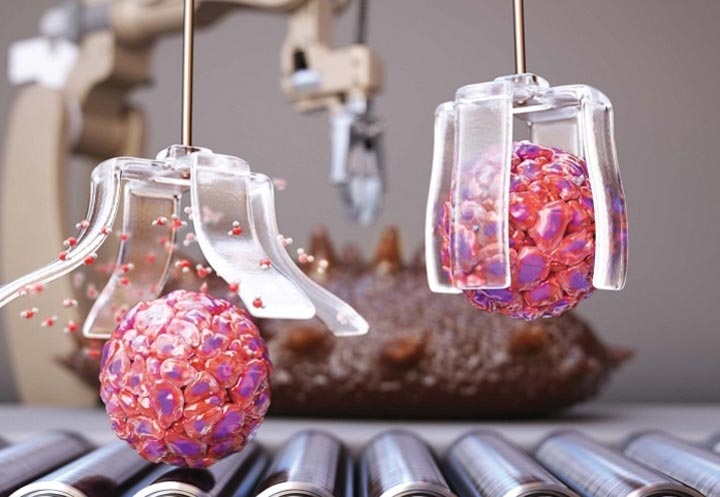Water-driven soft actuator developed

A programmable powerful and ultra-fast water-driven soft actuator inspired by the mutable collagenous tissue of the sea cucumber
Credit: POSTECH
Sea cucumbers have a bumpy and oblong shape. They are soft but stiffen up quickly when touched. They can shrink or stretch to several meters, and their original shape can be recovered even after they die and shrivel up with the regulation of water uptake. Recently, a POSTECH research team has developed a soft actuator inspired by this unique behavior of sea cucumbers.
A research team led by Professor Dong Sung Kim, Dr. Andrew Choi (currently the director of R&D at EDmicBio, Inc.), and Hyeonseok Han of POSTECH’s Department of Mechanical Engineering was inspired by the mutable collagenous tissue (MCT) of sea cucumbers to develop a water-driven self-operating soft actuator that exceeds the strength and speed of conventional soft actuators. This research was published as the inside front cover paper in the latest issue of Journal of Materials Chemistry A.
The body of a sea cucumber is made of MCT; and thus, it can be hardened or softened according to the surrounding environment. In a matter of a few seconds, the elastic modulus of sea cucumbers can change up to 10 times to quickly squeeze through crevices or inflate to threaten predators. This change is induced by the formation or destruction of hydrogen bonds in collagenous tissues by controlling its chemical regulators.
An actuator is a rigid device that alters a physical state by using an electrical signal change, such as a motor or a switch. However, a soft actuator that responds to water – which uses water as an energy source – can be applied to soft robotics that requires freedom in movement. However, the existing soft actuators are limited in their application due to their fragility and slow speed.
Inspired by the MCT of sea cucumbers that freely change shape by reacting with water, the research team designed an actuator to be programmable. This actuator is based on the bulk PNIPAAm hydrogel that changes very flexibly and showed an actuation force 200 times (2 newtons) greater and an actuation force 300 times (1/3 second) faster than the conventional soft actuators that use water as an energy source – even underwater at 80°C temperature. In addition, through several tests, it was demonstrated that the actuator was robust enough to restore the original shape even when subjected to 300% of tensile strain.
This actuator can be applicable in many different sectors such as industrial and biomedical fields, including industrial robots such as grippers that grab and lift materials like a human arm, wound closures, and artificial fingers.
“The soft robot activates when it comes in contact with moisture and is flexible and deformable to easily adapt to various environments,” explained Professor Dong Sung Kim. “This newly developed hydrogel actuator is very powerful and actuates quickly to enable operation even in places without electricity by using chemical energy.”
This research was conducted with the support of the Mid-career Researcher Program and the Core Technology Biomedical Development Program funded by the Ministry of Science and ICT and the National Research Foundation of Korea, and the Alchemist Project funded by the Ministry of Trade, Industry and Energy.
Journal: Journal of Materials Chemistry A
DOI: 10.1039/D1TA02566J
Article Title: A programmable powerful and ultra-fast water-driven soft actuator inspired by the mutable collagenous tissue of the sea cucumber
Article Publication Date: 15-Jun-2021
Media Contact
Jinyoung Huh
jyhuh@postech.ac.kr
Office: 82-54-279-2415
All latest news from the category: Materials Sciences
Materials management deals with the research, development, manufacturing and processing of raw and industrial materials. Key aspects here are biological and medical issues, which play an increasingly important role in this field.
innovations-report offers in-depth articles related to the development and application of materials and the structure and properties of new materials.
Newest articles

Scientists transform blood into regenerative materials
… paving the way for personalized, blood-based, 3D-printed implants. Scientists have created a new ‘biocooperative’ material based on blood, which has shown to successfully repair bones, paving the way for…

A new experimental infection model in flies
…offers a fast and cost-effective way to test drugs. Researchers at the Germans Trias i Pujol Research Institute and Hospital have reinforced their leading role in infectious disease research by…

Material developed with novel stretching properties
KIT researchers produce metamaterial with different extension and compression properties than conventional materials. With this material, the working group headed by Professor Martin Wegener at KIT’s Institute of Applied Physics…



